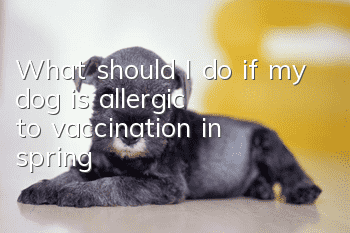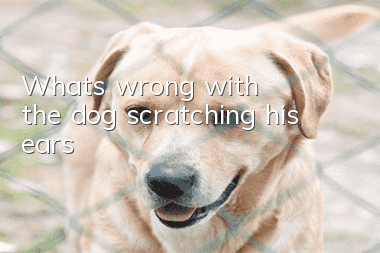What should I do if my dog is allergic to vaccination in spring?

In order to effectively prevent dogs from contracting infectious diseases and rabies, every dog owner should vaccinate their dogs in a timely manner. However, we should note that dogs are not suitable for vaccination at any time. In some special circumstances, vaccination may only have the opposite effect on the dog, so we should know how to vaccinate dogs Several issues to note before proceeding. What should I do if I have allergies?
1. If you just bought a puppy from the dog market, it is best to raise it at home for 2 weeks and then get vaccinated if there are no abnormalities. This can avoid interference with the immune plan due to physical decline due to stress response or the incubation period of the disease. This can be done at this time.
2. Dogs with unhealthy physiques, such as colds, allergies, severe calcium deficiency or parasitic infections, should be immunized after recovery to avoid unsatisfactory immunity.
3. Dogs that are too young (less than 6 weeks old) should not be injected with the so-called six-linked vaccine prematurely due to the presence of maternal antibodies in their bodies.
4. Some dogs may experience adverse drug reactions such as low fever, wilting, or discomfort, redness and swelling at the injection site, which usually disappear on their own in 2-3 days. For individual severe allergies, you should go to the hospital in time.
In these cases, it is best not to vaccinate the dog, because the vaccine must be injected under healthy conditions of the dog, otherwise it will easily cause adverse reactions, so the owner must not be in a hurry and harm the dog temporarily.
What should I do if I have a vaccine allergy?
Severe allergic type: Most symptoms occur within 2 minutes. The main clinical symptoms are elevated body temperature, rapid heartbeat, shortness of breath, mental stress and then lethargy, dull eyes, disheveled coat, cold nose, soft neck, and unsteady limbs. He was in a crawling and lying position and his condition was critical.
General allergic type: The onset usually occurs about 10 minutes after injection. The main clinical manifestations are depression, dull eyes, slow reaction, weak limbs, weakness in movement, and deep and slow breathing. For general allergies: Generally, no medication is needed, and the condition will return to normal after 1 hour.
For severe allergic types: carry out desensitization therapy as soon as possible. The dog is injected with 1 ml of chlorpheniramine injection subcutaneously and intravenously infused with 10% calcium gluconate (10 ml per kilogram of body weight). Relief can be achieved after 20 minutes. Otherwise, the dog can be injected with chlorpheniramine repeatedly. Ermin until symptoms subside.
- What age is the best age to neuter a dog?
- Symptoms and treatment of internal parasites in dogs
- How to train a dog to smile with bared teeth
- What training does an Australian Cattle Dog need?
- What causes diarrhea in dogs? Use these six steps to check it out.
- How many years can a dog live with rabies?
- The ten most common diseases in dogs, you should pay attention to them!
- What to do if your Lamborghini has a fever
- How much does a Xiasi dog cost? Is it easy to raise? Xiasi dog pictures | price | training
- Dogs can tolerate hunger but not thirst. Dogs also have a lot of knowledge about drinking water.



